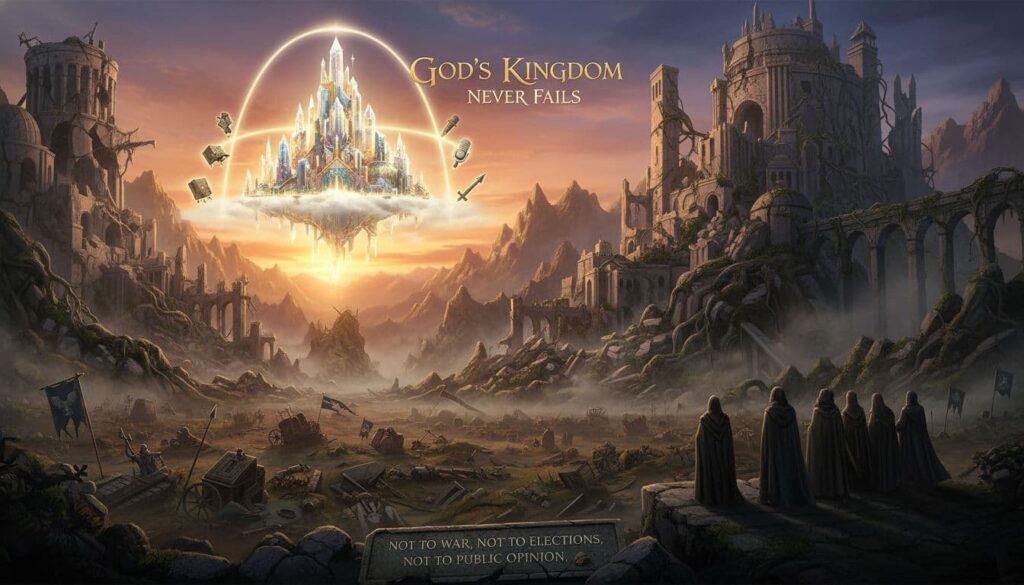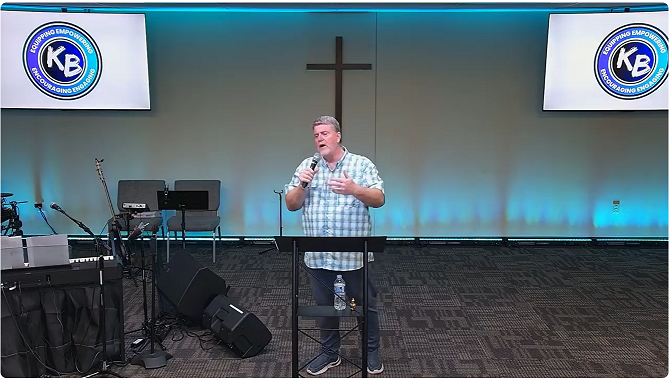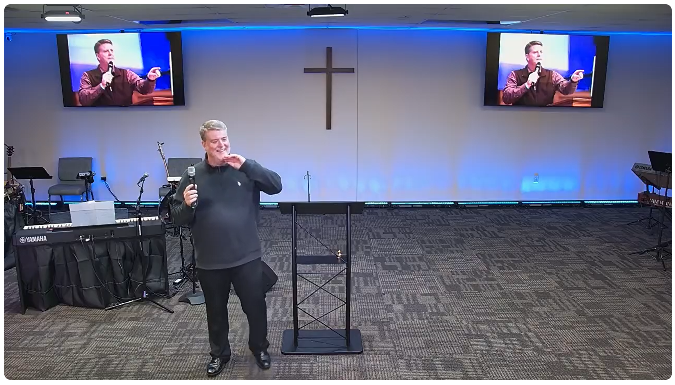Exploring the Greatness of God’s Kingdom (Kingdom Builders Week 2)
We often say, “God is great,” but many of us feel deep down that we barely grasp what that really means. When we slow down and look at creation, Scripture, and our own lives, we start to see that the Kingdom of God is bigger, nearer, and more active than we usually realize.
In this post, we walk through key ideas from a Kingdom Builders teaching: God’s majesty in creation, His care for us, Old and New Testament Kingdom truths, and what it really means to seek first His Kingdom and His righteousness in everyday life.

Praising God’s Unfathomable Greatness
God sits high above all of us, seeing everything, beginning to end. From our limited viewpoint, we only catch glimpses of His greatness.
We see some of that in modern technology. When we watch space documentaries and see images from deep space telescopes, we catch sight of swirling galaxies, strange colors, and vast star fields that our naked eyes can never see. All of that was spoken into existence by God and held together by His power.
At the same time, we look around this earth and see beauty everywhere. Mountains, rivers, forests, plains, beaches, deserts, and oceans all show His creativity and care.
The Vastness of the Universe
When we see high-resolution images of nebulae and distant galaxies, we get a tiny hint of how big God is. Whole star systems, light years across, sit in the palm of His hand.

Every distant cluster of stars tells us that God is not just slightly bigger than us, He is on a completely different scale. Resources like Crossway’s overview of 10 key Bible verses on the kingdom of God remind us that this same God rules a real Kingdom that stretches far beyond what we can see.
Beauty Across the Earth
Then we zoom back down to earth and see wonders closer to home:
- Grand Canyon, with its layered rock and vast depth.
- Yellowstone, with geysers, hot springs, and wildlife.
- Mountain ranges and forests, thick with trees, plants, and streams.
Every landscape whispers, “God is a master builder.”
Tiny Details in Creation
It is not just the big things. We look at insects, cells, and microscopic organisms that require a microscope to see. We could list ants, bees, bacteria, and even the tiny structures inside a single cell.
We find ourselves asking, “God, how did You know to do all this?” From the largest galaxy to the smallest particle, His wisdom fills everything.
God’s Care for Humanity, Even After Rejection
What humbles us most is not that God created all of this, but that He cares about us.
Humanity has turned away from Him, rejected Him, and tried to live without Him. Yet Scripture declares, “While we were yet sinners, Christ died for us.” The King we rejected came and died in our place.
We can barely comprehend that kind of love. The more we think about it, the more we say, “Lord, we just cannot wrap our minds around You.” But that is the foundation of the Kingdom message: a holy, all-powerful God who still chooses to love, redeem, and reign in the hearts of imperfect people.
If we want to see how that love shows up in real people’s stories, we can look at Exciting Testimonies of Living as Kingdom Citizens, where everyday believers share how God’s rule has changed their lives.
Review: What We Mean by the Kingdom of God
In week one of Kingdom of God, we looked at what “Kingdom” actually means.
- The Kingdom of God is not first a physical place.
- It is God’s rule and reign in our lives.
- Heaven is a real place, but right now God’s Kingdom is present wherever He is obeyed and honored.
The New Testament word basileia means kingship, rule, or reign, not just territory. It points to authority and dominion.
The Old Testament also uses Kingdom language with the idea of dominion. God created humans to have delegated authority on the earth, under His supreme Kingship.
We also used the picture of a colony. The Greek word politeuma describes a settlement living in a new territory, still under the government of a distant homeland. Early America was formed of colonies under England. The Bahamas were a British colony for years.
In the same way, we as believers are like a colony of Heaven on earth. We live here, but we live under the rule of King Jesus, who reigns from Heaven.
A Gate Illustration: Standing Outside vs Entering In
To picture the Kingdom, we imagined standing outside the gates of an exciting place.
Some of us think of Disney World, Disneyland, an amusement park, or even a local zoo. We imagine standing by the gate. We smell the food. We hear the laughter. We see the lights and rides. We watch people enjoy themselves.
But we never go in.

Many people live that way with the Kingdom of God. They stand close. They hear about it. They see glimpses in the lives of others. But they never step through the gate.
When Jesus came, He did not just talk about the Kingdom. He brought the Kingdom with Him. He opened the gate for “whosoever will” to come in.
Old Testament Kingdom Foundations
Many of us think “Kingdom of God” is mainly a New Testament topic. But once we start reading, we see Kingdom language all over the Old Testament.
God Enthroned Above the Earth
Isaiah 40:22 says, “He sits enthroned above the circle of the earth.” Long before satellites, Scripture described the earth as a circle under the throne of God.
Isaiah 66:1 adds, “Heaven is my throne and the earth is my footstool.” The Psalms echo this again and again:
- “The Lord is in His holy temple, the Lord’s throne is in Heaven” (Psalm 11:4).
- “The Lord has prepared His throne in the heavens; and His Kingdom rules over all” (Psalm 103:19).
God is not limited to one location. His throne is above every change and every crisis.
God’s Universal Reign
From these verses, we learn that God’s universal reign is:
- Eternal
- Unshakable
- Higher than every earthly power
Nations rise and fall. Leaders come and go. But God’s Kingdom stays steady. We can have peace because His plan keeps moving forward, even when the world looks chaotic.
Classical pieces like Handel’s “Hallelujah Chorus,” with the words “The Lord God omnipotent reigneth,” echo what Scripture has said for centuries.

Matthew Henry on God’s Throne
Matthew Henry once wrote, “God’s throne is fixed above change and disturbance. His providence rules all creation.” That is a Kingdom statement. The King is never shaken. He never panics.
David’s Prayer: “Yours Is the Kingdom”
In 1 Chronicles 29:11–12, David prays a powerful Kingdom prayer:
“Yours, O Lord, is the greatness and the power and the glory and the victory and the majesty. For all that is in heaven and in the earth is Yours. Yours is the Kingdom, O Lord, and You are exalted as head above all. Both riches and honor come from You, and You reign over all…”
Notice what David recognizes:
- The Kingdom belongs to the Lord.
- His rule is not limited to a map or border.
- All riches and honor ultimately come from Him.
God is omnipresent by His Spirit. David wrote in another psalm that even if he made his bed in hell, God would still be there. There is no place we can go where God is not present.
Allegiance to the Kingdom Above Any Nation
We thank God for the blessings of nations like America. We are grateful for freedoms, history, and opportunity.
But our highest allegiance is not to any earthly flag. It is to the King and His Kingdom.
If a nation turns away from God or drifts off track, we do not follow it into disobedience. We stay loyal to Jesus first.
Daniel 2: A Kingdom That Will Never Be Destroyed
In Daniel 2, King Nebuchadnezzar has a dream of a giant statue with a head of gold, chest and arms of silver, belly and thighs of bronze, legs of iron, and feet of iron mixed with clay. Each part represents a great empire like Babylon, Medo-Persia, Greece, and Rome.
Then Daniel describes a stone “cut out of the mountain without hands” that strikes the statue and crushes it. He explains:
“In the days of these kings the God of Heaven will set up a Kingdom which shall never be destroyed… it shall break in pieces and consume all these kingdoms, and it shall stand forever” (Daniel 2:44–45).
Every empire that looks untouchable will eventually fall. But God’s Kingdom will never fall. Not to war, not to elections, not to public opinion.

Seeing the Kingdom in Our Time
We also talked about how God still uses public moments to lift up His name.
At a recent national funeral, worship leader Chris Tomlin sang, “All thrones and dominions, all powers and positions, Your name stands above them all,” in front of leaders and millions of viewers. Many of us watched that moment and sensed something weighty. God was reminding the world that, above every office and title, there is a higher throne.
Moments like that fit what many teachers describe as living with an eternal focus. Pastor Tommy Bates has a helpful message on this in Kingdom Minded: Focusing on Eternity, where he calls believers to think more about the eternal Kingdom than the temporary world.
We also reflected on how God often uses the death of a single believer to touch multitudes, just like Jesus taught in John 12:24 about a grain of wheat falling into the ground and dying in order to bring forth much fruit.
New Testament Kingdom Truths
After looking at Old Testament foundations, we moved into the New Testament, where the language of the Kingdom becomes even clearer.
“The Kingdom of God Is at Hand”
In Mark 1:15, Jesus begins His ministry saying:
“The time is fulfilled, and the Kingdom of God is at hand. Repent, and believe in the Gospel.”
The phrase “at hand” means “has drawn near” or “has arrived.” In the original language, it points to something that started in the past and continues in the present.
Jesus was not only announcing a future Heaven. He was saying, “The Kingdom has arrived in Me, and it is now open to you.”
If we want a quick overview of more Kingdom verses across Scripture, collections like 90 Bible verses on the kingdom of God or OpenBible’s list of what the Bible says about the kingdom of God can give us many passages to pray and study.
Jesus’ Core Mission: Preach the Kingdom
In Luke 4:43, Jesus says,
“I must preach the Kingdom of God to the other cities also, because for this purpose I have been sent.”
His miracles, parables, and teaching all pointed to the reign of God breaking into human life. When He healed the sick, cast out demons, and forgave sins, it was the Kingdom showing up in real time.
We saw a local example when a young woman came into service having repeated seizures and tremors. The body gathered around her, prayed in unity, and the seizures stopped. That was not just a “nice moment,” that was the King exercising His authority over darkness.
Matthew 6:33: Seeking First the Kingdom
All of this leads to one of the clearest Kingdom commands Jesus gives:
“Seek first the Kingdom of God and His righteousness, and all these things shall be added to you” (Matthew 6:33).
To understand “all these things,” we look at the verses before it.
Birds, Lilies, and Our Worries
Jesus points to:
- The birds of the air that do not sow or reap, yet the Father feeds them.
- The lilies of the field that do not work or spin, yet Solomon in all his glory was not dressed like one of them.
- The grass that grows briefly then is burned, yet God still clothes it.
He then says that many people spend their lives chasing food, drink, and clothing. In our day, we could add bills, savings, retirement, and status.
None of that is evil. But when it becomes our first concern, we slide out of Kingdom thinking.
Jesus’ answer is simple: Our Father knows that we need these things. So, instead of seeking them first, we seek His kingdom and His righteousness first. Then He takes responsibility for adding what we need.
A Kingdom Mindset vs A Worried Mindset
This is where repentance comes in. Repentance is more than feeling sorry. It is a change of mind and direction.
A Kingdom mindset says:
- “God is my King and my Provider.”
- “He sees what I need before I do.”
- “I will obey Him first, then trust Him to handle the rest.”
A worried mindset says:
- “It all depends on me.”
- “If I do not figure this out, everything will fall apart.”
- “God might not come through.”
When we worry constantly, we are quietly saying, “God, I am not sure You can or will take care of me.” Most of us have had to face that. Some of us grew up in lack and fear, and those patterns still try to speak louder than God’s promises.
But Jesus offers a better way. He calls us to seek the Kingdom, trust the King, and stop making worry our normal.
Real-Life Stories of Trusting the King
One couple in the class shared how, after moving from another state, they went fourteen months without a job. Their savings were shrinking. Their minds were flooded with questions: Did we miss God? Did we make a mistake?
Yet they kept praying, stayed in fellowship, received encouragement, and watched God provide. Over time, doors opened and they could look back and see that God had been working on both ends, not just in their hearts, but also in the people and place He was calling them to.
Their story reminds us that God does not only prepare us for the future. He also prepares the future for us.
Guarding Our Words and Focus
We also talked about how our words reveal where our trust really is.
When we constantly speak fear, failure, and hopelessness, we agree with the enemy’s lies. When we speak the Word of God, we agree with the King.
Isaiah 26:3 gives a clear promise: “You will keep him in perfect peace, whose mind is stayed on You, because he trusts in You.” Peace comes when we keep our minds set on the Lord instead of circling our problems over and over.
Peter walking on the water is a picture of this. As long as he kept his eyes on Jesus, he walked above the waves. When he stared at the wind and the storm, he sank. The water did not gain power. His focus shifted.
Our storms may be medical, financial, family, or emotional. The principle is the same. When we keep our eyes fixed on Jesus, we stand. When we stare at the storm, we start to go under.
The Shepherd King Who Provides
Psalm 23 ties this together with a Kingdom picture in everyday words.
“The Lord is my shepherd; I shall not want. He makes me to lie down in green pastures; He leads me beside the still waters.”
The shepherd knows:
- Where the green pastures are.
- Where the still waters are.
- Where the snakes, pits, and thorns are.
He goes ahead of the sheep, clears the way, and then leads them into what is good. Jesus does the same for us.
We serve a King who is also our Shepherd. He is powerful enough to rule the universe and gentle enough to lead us one step at a time.
Key Takeaways: Living as Citizens of God’s Kingdom
As we bring these threads together, several truths stand out:
- God’s Kingdom is already here and will one day be fully visible.
- God’s throne is fixed above every crisis, ruler, and nation.
- Jesus’ main message was the Kingdom, and He backed it up with power.
- Entering the Kingdom starts with repentance and faith in the Gospel.
- Seeking the Kingdom first breaks the grip of worry and fear.
- Our allegiance belongs to the King before any earthly system.
- Our words and thoughts either line up with the King or with our fears.
If we want more practical examples and teaching on living this out, the message What It Means to Live in the Kingdom of God offers a helpful extension of these truths in everyday life.
Conclusion: Seek the King First, Today
When we step back and look at the galaxies, the earth, the cross, and our own stories, one thing becomes clear: the Kingdom of God is not far away or abstract. It is present, active, and available to us right now.
We are not waiting for the rapture to finally become Kingdom people. We are called to live as citizens of that Kingdom today, under the care of a good King who knows what we need, leads us by His Word, and calls us to trust Him more than we trust our fears.
Let us ask ourselves: Where do we need to repent of worry, seek His rule first, and align our words and thoughts with His promises? As we do, we will not just talk about the Kingdom. We will live in it.



